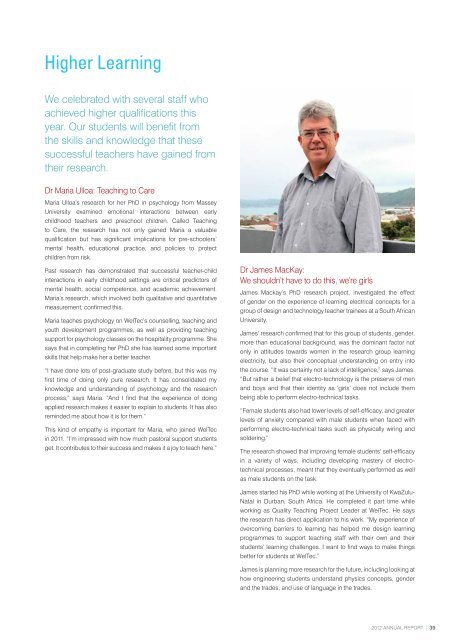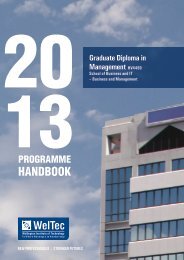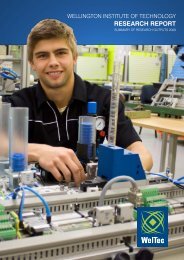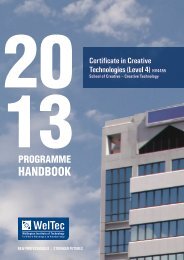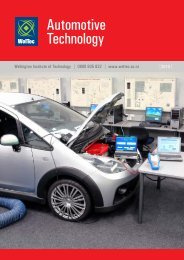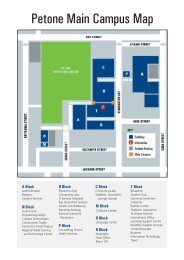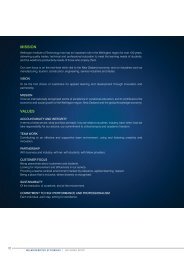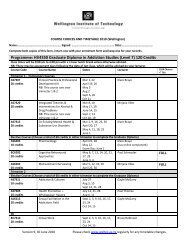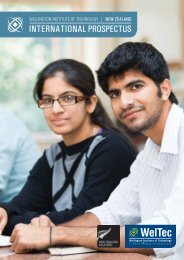Download PDF (7.6MB) - Wellington Institute of Technology
Download PDF (7.6MB) - Wellington Institute of Technology
Download PDF (7.6MB) - Wellington Institute of Technology
You also want an ePaper? Increase the reach of your titles
YUMPU automatically turns print PDFs into web optimized ePapers that Google loves.
Higher LearningWe celebrated with several staff whoachieved higher qualifications thisyear. Our students will benefit fromthe skills and knowledge that thesesuccessful teachers have gained fromtheir research.Dr Maria Ulloa: Teaching to CareMaria Ulloa’s research for her PhD in psychology from MasseyUniversity examined emotional interactions between earlychildhood teachers and preschool children. Called Teachingto Care, the research has not only gained Maria a valuablequalification but has significant implications for pre-schoolers’mental health, educational practice, and policies to protectchildren from risk.Past research has demonstrated that successful teacher-childinteractions in early childhood settings are critical predictors <strong>of</strong>mental health, social competence, and academic achievement.Maria’s research, which involved both qualitative and quantitativemeasurement, confirmed this.Maria teaches psychology on WelTec’s counselling, teaching andyouth development programmes, as well as providing teachingsupport for psychology classes on the hospitality programme. Shesays that in completing her PhD she has learned some importantskills that help make her a better teacher.“I have done lots <strong>of</strong> post-graduate study before, but this was myfirst time <strong>of</strong> doing only pure research. It has consolidated myknowledge and understanding <strong>of</strong> psychology and the researchprocess,” says Maria. “And I find that the experience <strong>of</strong> doingapplied research makes it easier to explain to students. It has alsoreminded me about how it is for them.”This kind <strong>of</strong> empathy is important for Maria, who joined WelTecin 2011. “I’m impressed with how much pastoral support studentsget. It contributes to their success and makes it a joy to teach here.”Dr James MacKay:We shouldn’t have to do this, we’re girlsJames Mackay’s PhD research project, investigated the effect<strong>of</strong> gender on the experience <strong>of</strong> learning electrical concepts for agroup <strong>of</strong> design and technology teacher trainees at a South AfricanUniversity.James’ research confirmed that for this group <strong>of</strong> students, gender,more than educational background, was the dominant factor notonly in attitudes towards women in the research group learningelectricity, but also their conceptual understanding on entry intothe course. “It was certainly not a lack <strong>of</strong> intelligence,” says James.“But rather a belief that electro-technology is the preserve <strong>of</strong> menand boys and that their identity as ‘girls’ does not include thembeing able to perform electro-technical tasks.“Female students also had lower levels <strong>of</strong> self-efficacy, and greaterlevels <strong>of</strong> anxiety compared with male students when faced withperforming electro-technical tasks such as physically wiring andsoldering.”The research showed that improving female students’ self-efficacyin a variety <strong>of</strong> ways, including developing mastery <strong>of</strong> electrotechnicalprocesses, meant that they eventually performed as wellas male students on the task.James started his PhD while working at the University <strong>of</strong> KwaZulu-Natal in Durban, South Africa. He completed it part time whileworking as Quality Teaching Project Leader at WelTec. He saysthe research has direct application to his work. “My experience <strong>of</strong>overcoming barriers to learning has helped me design learningprogrammes to support teaching staff with their own and theirstudents’ learning challenges. I want to find ways to make thingsbetter for students at WelTec.”James is planning more research for the future, including looking athow engineering students understand physics concepts, genderand the trades, and use <strong>of</strong> language in the trades.2012 ANNUAL REPORT | 39


